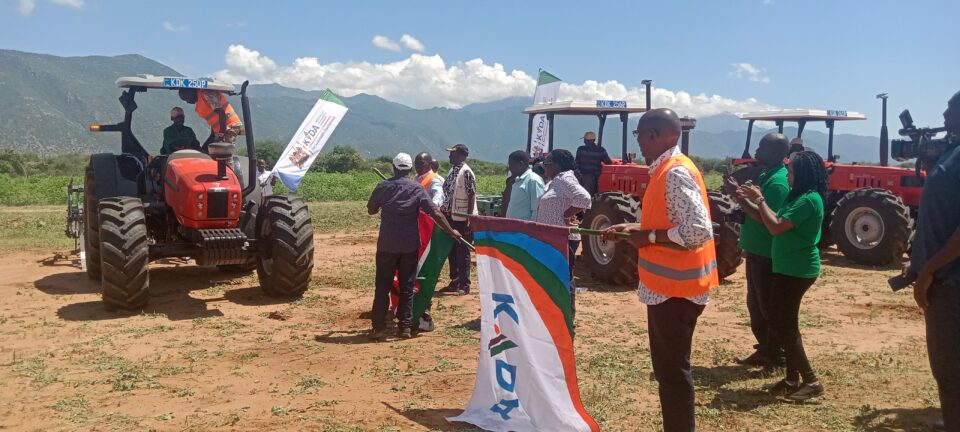Farmers from the Weiwei irrigation scheme in the semi-arid areas of Sigor constituency, Pokot Central Sub County, stand a high chance of lifting themselves from poverty and hunger after the Kerio Valley Development Authority (KVDA) operationalizes the one-billion-shilling Phase 3 project for food production and security through irrigation.
Over the weekend, the KVDA authority issued farm machinery, including three tractors, to smallholder farmers in the irrigation scheme courtesy of funds from the Italian Cooperation Agency, which has long engaged with KVDA in development programmes that promote sustainable agriculture and irrigation in the semi-arid area of Pokot Central sub-county.
Phase 3, which covers 325 hectares of land, was launched by President Uhuru Kenyatta in 2016 and President William Ruto, then Deputy President, with the intention of boosting food security in the region.
The Phase 3 project is funded by the Italian Development Cooperation in collaboration with the government of Kenya.
KVDA Managing Director Sammy Naporos has declared that Phase three is now on course after it experienced challenges due to COVID-19, bad climatic conditions, and part of the civil work taking a bit of time.
The Weiwei irrigation scheme was started in 1984 by the Italian government after drought hit Kenya, with the aim of addressing food security in the semi-arid region.
“Phase 3 is now fully been operational. Phase one was completed in 2018.The Weiwei integration program has become the bread basket of West Pokot, Turkana, Baringo, and Trans-Nzoia. The products from the scheme go up to Kitale and Eldoret towns,” Director Naporos said.
The KVDA boss noted that the project is one of the most transformational social economic programs in terms of improved living standards, resilience, self-reliance, and human security.
“The larger challenge of Kerio Valley is a result of shared resources, and we have conflict. The expansion of the scheme by an additional 325 acres will reduce conflict among communities through farming, which has an economic impact on social development,” he reiterated.
Mr Naporos noted that last year farmers generated Sh75 million after they sold to the Kenya Seed Company 1500 metric tons of maize seeds.
He said farmers this year expect to harvest 3500 metric tons of maize after the addition of the 325 acres.
He pointed out that the scheme now has a lot of water for irrigation from the Weiwei River and other rivers from the Cherangany Hills.
Mr Naporos said the authority has adopted measures that will ensure conservation of the catchment areas to sustain the flow of the rivers in the region.
He said the irrigation scheme has created jobs for about 3000 people who work in the sector, and they plan to expand the scheme to the Masol area in Pokot Central and Tiaty in Baringo County.
He said for sustainable farming systems, the scheme used to have nine tractors, and they have received three more tractors for farmers.
KVDA Chairperson Mark Chesergon stated that Weiwei irrigation was a successful project in the region that helped increase food production, productivity, and farm income.
This region has been faced with drought and needs proper attention for residents to produce food. We want to produce more crops in the region. We have also planted fruits for food security,” Chairman Chesergon said.
Weiwei Farmers Association Chairman Mark Meut lauded the national and the Italian governments for funding the project, saying the scheme has more than 1000 acres of land and will help in food security and wealth creation for the residents.
He said that through the irrigation scheme project, many families who were unable to take their children have managed to educate their children to the highest levels of education.
Mr Meut pointed out that the phase 3 project will help address the challenge of the plot demand of farmers who wanted to be allocated plots for farming activities.
Stephen Tingoria, a beneficiary of the project, narrated that the scheme has been helpful for him and his family.
“We need Phases 3 and 4. Initially we were using furrows, which had many challenges, but now the sprinkler technology has helped us a lot,” he narrated.
He said farming activities by locals have helped reduce banditry and cattle rustling in the region.
David Lotudo, a farmer, said that phases 1 and 2 had some challenges because the larger families depended on a single plot for farming, leading to low sharing of farm produce. But with additional land for production in phase 3, they expect higher yields to sustain the larger families.
West Pokot County Executive Member of Agriculture Wilson Longronyang said that permanent rivers like Turkwel, Muruny, Weiwei, and Kerio can feed the whole country.
The rainfall in the region is unpredictable and erratic. We need irrigation agriculture to help us. The Weiwei irrigation scheme has improved the region’s economy,” he said.
Luigi Luminari, director of rural development and food security at the Italian Cooperation, said the project will change the lives of area residents who are affected by drought.
“We shall have a huge social and economic impact.This is one of the best approaches to climate change adaptation,” he said, noting that the Phase 3 of the project has started to pay off.
“This is one of the two best projects in Africa in terms of natural resource management in semi-arid areas. We are doing environmental conservation because the greatest risk is environmental degradation,” said Director Luminari.


